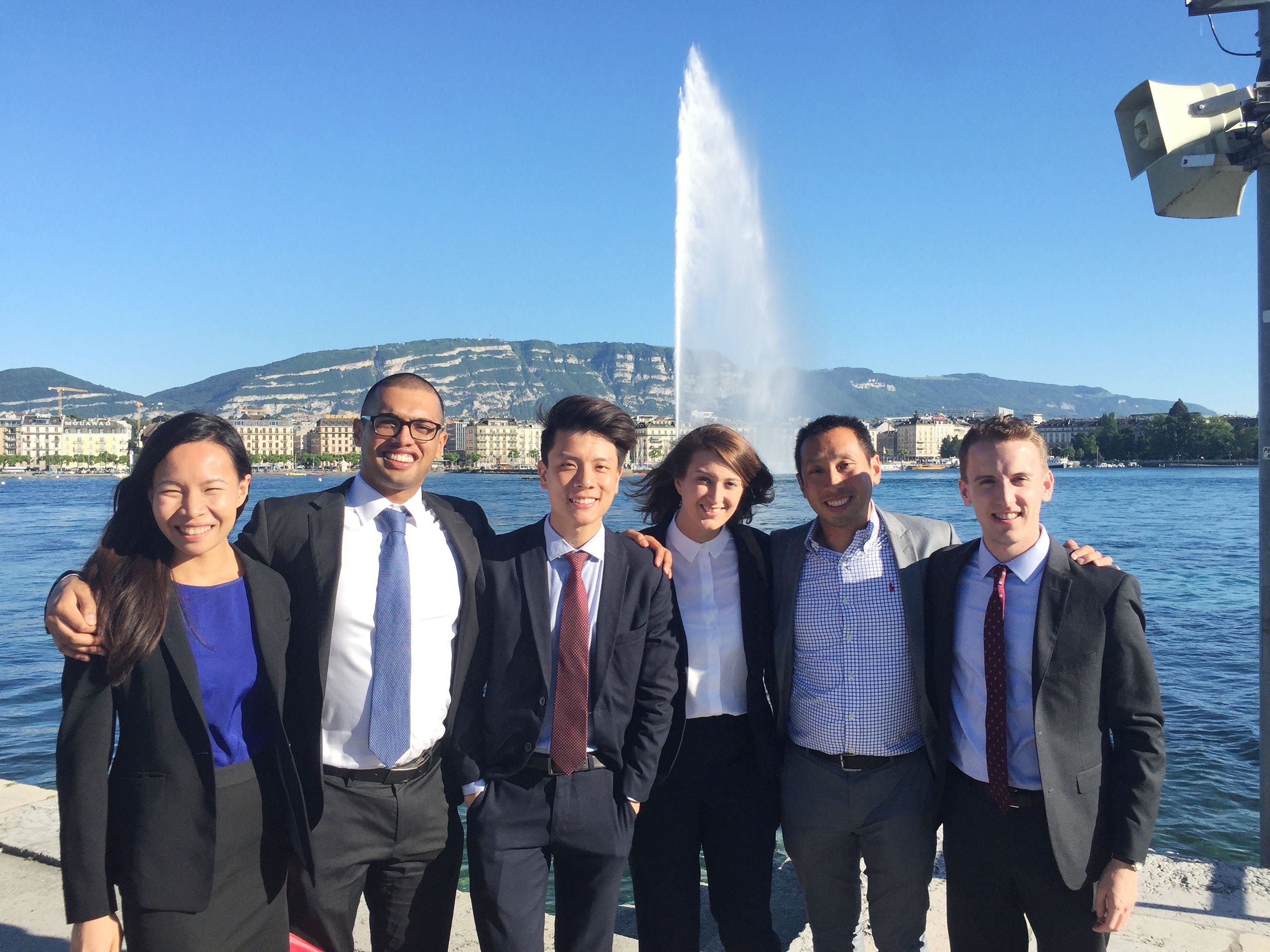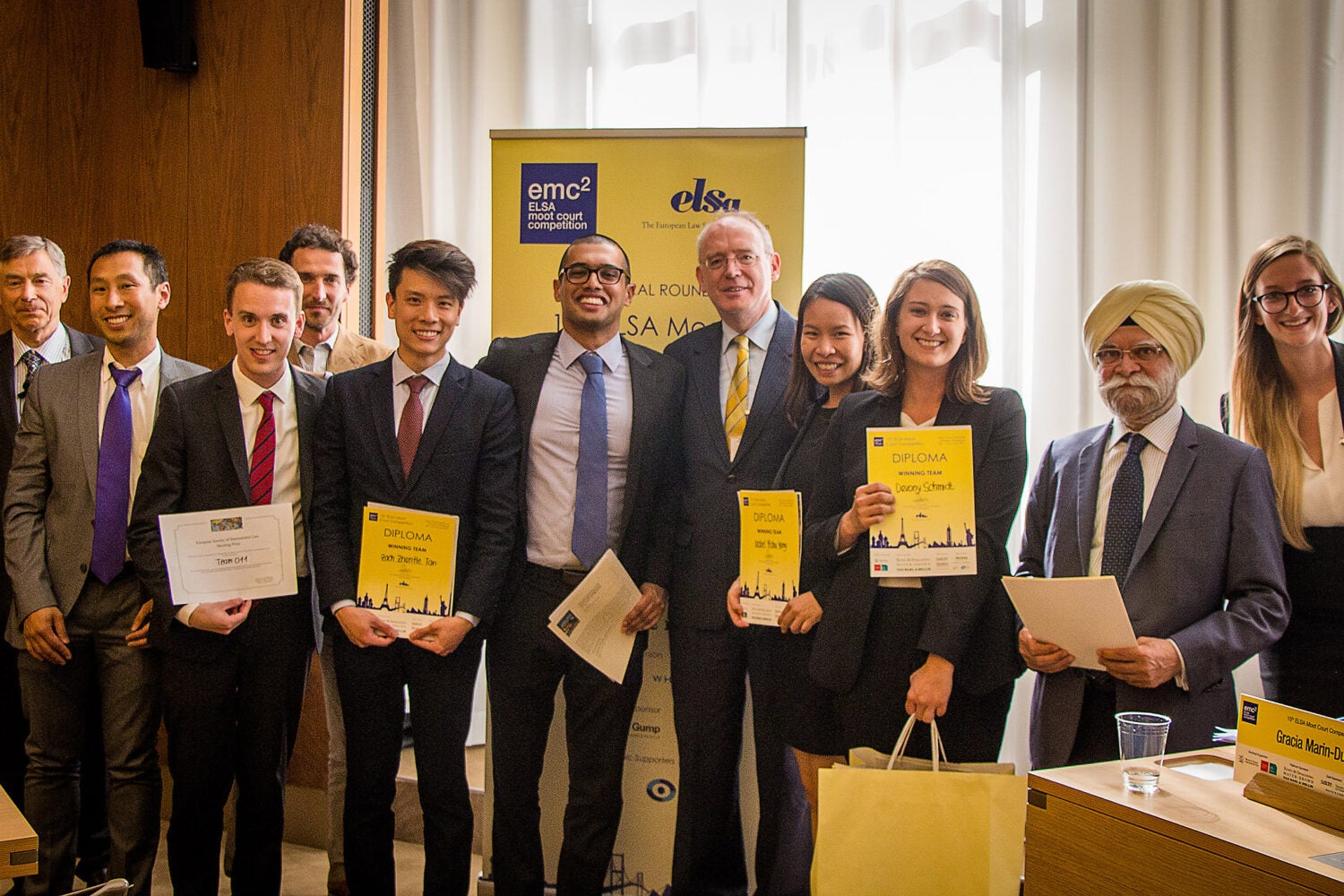Harvard Law School’s World Trade Organization (WTO) moot court team won the 15th Annual European Law Students Association (ELSA) Moot Court Competition on WTO Law on June 10. The international final round was held over five days in Geneva, Switzerland, with the grand finals taking place at the WTO headquarters. Seventy-nine teams spanning six continents and 32 countries took part in the competition which began in February. HLS has advanced to the semifinals of the final round in three of the past five competitions, including placing second in 2014, but this marks the first time that HLS has won. It is also the first time that a team from a North American law school has prevailed in the competition.
The team–Isabel Yang ’18 (team captain), Devony Schmidt ’19, Zach Tan ’19, and Alex Kamath ’18, along with student coaches Ted Brackemyre ’17 and Jordan Movinski ’17– advanced to the final round after winning the North America regional competition in Bogota, Colombia in March. Professor Mark Wu is the team’s faculty advisor.
Each fall, interested students submit applications for a spot on the WTO team and coaches host individual tryouts. The final team of four was selected in October. While the team was able to prepare as group before the regional competition in Bogota, because of final exams, graduation and summer jobs, the preparation for the final rounds was done individually or one-on-one. Former team members also helped with preparations by mooting the team.
Cooperation on global economic issues under mutually-agreed rules is more important than ever. … [T]he ELSA WTO Moot Court Competition is so important because it helps to boost legal skills and experience and train the next generation of trade lawyers.
WTO Director-General Roberto Azevêdo
“The true brilliance of this team stemmed from its ability to contribute to and collaborate with each other in a number of ways. As a group, the team possessed a rare curiosity for this year’s case and the finer points of WTO law,” said co-coach Ted Brackemyre. “Countless hours were spent together workshopping already ‘good’ arguments, in order to make them ‘great.’ As a result, the team reached an impressive level of depth and creativity in their arguments.”

The team argued the grand final round before a panel of nine prominent WTO jurists and lawyers, including the Chair of the WTO Appellate Body, Ambassador Ujal Singh Bhatia of India; former Appellate Body member and Seoul National University Professor Seung Wha Chang LL.M. ’92 SJD ’94, and several WTO officials including the director of the Legal Affairs Division and a counsellor who authored this year’s case.
Ambassador Bhatia, who served as the competition’s presiding judge, said: “The arguments of the Harvard team were refreshingly lucid and well substantiated. They had clearly done their homework and left few loose ends for the Bench to question. Very impressive.”
“The HLS Team was perfectly balanced in pursuing the two demanding goals for a moot court participating team: well-prepared presentations and responsive answers to the Panel’s questions,” said Professor Chang. “Each member of the team also seemed to share important roles without relying on one or two members only, which revealed an excellent team-spirit.”
In addition to the team’s overall victory, each member of the team won an individual speaker award: Yang was named best oralist of the grand final round in Geneva; Schmidt received best oralist for the semifinal round in Geneva; Tan was named best oralist of the quarterfinals in Geneva; and Kamath received the best oralist of the semifinal and final rounds in Bogota.
Professor Wu said, “This group truly bonded as a team. Every person had their own unique strengths, but they and their coaches found ways to make each person even better. The fact that each person won a best oralist at some stage of the competition just highlights the team’s tremendous depth. It was an amazing run that I will never forget.”
The WTO moot court competition is organized by ELSA, an independent, non-profit organization, with the support of the WTO as a technical sponsor and partner. The competition brings together students from law schools across the world to participate in simulated WTO dispute settlement hearings. Students first compete in one of five regional rounds around the world to qualify for the international final round. The event is widely considered to be the world’s leading international trade law moot court competition.
